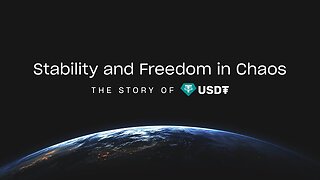Premium Only Content

Ana Foxxx | The Equal Opportunity Employer: (Mis)Applications Of Affirmative Action
In an attempt to create a diverse and inclusive workplace, entrepreneurs often find themselves at a crossroads. On one side lies the noble intention of being a genuine equal opportunity employer, while on the other, the specter of nepotism, tribalism, affirmative action, tokenism, and the tragedy of hiring mediocrity solely for diversity's sake loom large. Navigating this dilemma requires not only a commitment to fairness but also a deep understanding of the nuances that define authenticity in our quest for diversity.
Tokenism, as we all know, is the act of parading a single representative from a marginalized group to pacify the demands for diversity. This not-so-subtle art of including individuals from underrepresented groups for appearance's sake rather than their genuine contributions haunts the corridors of many institutions. It's a superficial nod to diversity that fails to address the core issues of inclusion and belonging.
Tokenism is further compounded by the concept of diversity hires, i.e., the practice of filling quotas in the name of representation, regardless of competence or meritocracy. The tragedy deepens when individuals are chosen not for their skills, passion, or dedication but because their presence fulfills an arbitrary diversity checkbox. Competence sacrificed at the altar of superficial diversity renders the noble pursuit of equal opportunity hollow—a mere facade obscuring the genuine meritocracy we strive for.
I reject the notion that fulfilling quotas should come at the expense of competence, for true equality demands excellence, not compromise or dumbing down. Just as the Lord is no respecter of persons, brilliance knows no gender, race, religion, or background.
So, does this mean there is no place for affirmative action? The quick, careless, and dismissive answer would be yes—power is taken, not given.
But I heard once that: "Equality is giving everyone a shoe. Equity is giving everyone a shoe that fits. Justice is when we don't need to give everyone a shoe because they can get their own shoe—a shoe that fits."
Tokenism undermines the very essence of equal opportunity. It reduces individuals to mere symbols, figureheads, and placeholders meant to adorn corporate brochures or to check boxes on diversity reports. The tragedy lies in the fact that, despite good intentions, it perpetuates stereotypes, incubates resentment among employees, and hinders real progress.
Affirmative action, at its core, is a policy designed to address systemic inequalities and historical injustices that women and minority groups in any given country's context have faced in education and employment. It is a recognition that achieving equality sometimes requires proactive measures to level the playing field. However, when misapplied, affirmative action can indeed undermine the principles of competence and meritocracy.
So, how can we strike a balance? (without compromising the fundamental principle that candidates should be hired, promoted, or admitted based on their abilities and qualifications)
The key lies in the intent and implementation of affirmative action. Instead of viewing it as a shortcut to diversity, we should consider it as a means to broaden the pool of qualified candidates. Affirmative action can be a tool to identify and nurture potential talent from underrepresented groups who might have been overlooked due to societal biases and barriers. It acknowledges that talent and potential exist across all demographics.
So, yes, there is a place for affirmative action, but strictly when it is a temporary, targeted measure designed to rectify specific imbalances. This way, it does not undermine competence and meritocracy but rather supplements them in the pursuit of not just genuine equality for the marginalized but justice for all, including those perceived or imagined to be privileged.
This approach fosters an environment where individuals from privileged and underprivileged backgrounds can both perform and truly be themselves, unburdened by the weight of representing their entire group. After all, it's individuals, not their communities, that bring a unique set of experiences, perspectives, and talents to the table.
-
 21:06
21:06
Russell Brand
7 hours agoIT'S COMING
87.8K324 -
 21:26
21:26
Stephen Gardner
1 day ago🔥What JUST leaked out of Congress must be STOPPED NOW!
104K248 -
 53:25
53:25
tether
11 days agoStability and Freedom in Chaos: The Story of Tether USD₮ | Tether Documentary (USDT)
124K5 -
 56:44
56:44
VSiNLive
2 days agoFollow the Money with Mitch Moss & Pauly Howard | Hour 1
65.8K2 -
 36:50
36:50
Anthony Pompliano
2 days ago $15.66 earnedInvestors Are ALL-IN On Bitcoin
62.4K20 -
 32:19
32:19
SB Mowing
9 days agoA Backyard She’s NEVER Seen – Now Safe for the Kids to Play!
59.4K28 -
![[Day 26] CS Blast bounty baby](https://1a-1791.com/video/fwe2/8a/s8/1/Z/H/j/_/ZHj_w.0kob-small-Day-26-CS-Blast-bounty-baby.jpg) 2:09:11
2:09:11
ggezlol_tv
11 hours ago[Day 26] CS Blast bounty baby
91.6K3 -
 2:32:17
2:32:17
Sgtfinesse
10 hours ago💥Sunday Morning Hunt for Featherweight Artifact | New World PVP Server: Sclavia
93.1K4 -
 11:25
11:25
Film Threat
1 day agoLET'S DISCUSS THE 2025 OSCAR NOMINATIONS | Film Threat News
67.7K20 -
 13:07
13:07
DEADBUGsays
11 hours agoThe Southport Massacre, The Great British Cover-Up
57.1K35